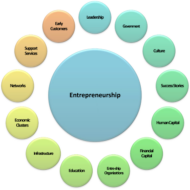Posted by Managementguru in Business Management, Decision Making, Human Resource, Leadership, Organisational behaviour, Training & Development
on May 18th, 2016 | 0 comments

Managing people require a completely different skill set than managing tasks. The transition from being an individual contributor to someone responsible for the work of others and team performance results in a steep learning curve. Learn how to motivate, delegate, communicate and lead. Play to your strengths and improve on key weakness areas. With an emphasis on building high achieving teams, dealing with an increased workload and developing the influence, assertiveness and confidence necessary to be an effective manager or supervisor – this course will ensure you hit the ground running.

Posted by Managementguru in Entrepreneurship, Human Resource
on Feb 25th, 2014 | 0 comments

Who is an Entrepreneur? An entrepreneur is one with long term vision, creativity, uniqueness and the most conspicuous feature is undoubtedly his risk taking ability. He embarks on uncertain investments and also possesses an unusually minimal level of uncertainty aversion. He always comes out with brilliant business ideas since he is open to new information available in the rapidly changing business environment; this also facilitates self-directed and independent decisions aiding in quick growth maximization of the business enterprise. Concept of Entrepreneurship Entrepreneurship is all about action that involves opportunity exploitation and venture creation. The concept of entrepreneurship is becoming increasingly popular in developing countries as it tends to promote economic growth of a nation. “No entrepreneur, no development,” is the kind of significance attached with entrepreneurialism. Who is an Entrepreneur Though entrepreneurship is an individual’s free choice activity, it emerges and functions in a social and cultural setting. An entrepreneur must be prudent in choosing a business activity that will be supported and valued by the society and that which improves his economic standards. Consumers are always on the look-out for a product or a service that is different but unique. This proves to be an advantage for an entrepreneur to exploit the unexplored niches of the market segment. An entrepreneur has to observe and act upon opportunities that are unusual but promising. He has to study the pros and cons of a project in terms of capital investment, plant layout, production facility, labor availability, market proximity, demography, people’s preference and economic viability. The distinct features of an entrepreneur for a better understanding: Persistence and perseveranceResourcefulness to take the business activity to the next levelEternal quest for knowledgeQuality consciousSystematic planningSelf-confidenceDaringCrisis management with easePersuasion –capability to convince the customers and othersStrategy king Excellent communication skills Proficiency in a variety of subjects and disciplinesTo them , work is passionNonchalance and the like. It is the combination of body of knowledge, set of skills and cluster of appropriate motives that makes an entrepreneur a star performer. He is the pivot about which all other factors of production, productive resources and techniques revolve. Innovativeness, risk taking ability and proactiveness are the three dimensions fundamental to the concept of entrepreneurship. Entrepreneurship is a way of thinking, reasoning and acting that is opportunity obsessed (Timmons). Lakshmi Mittals and Warren Buffets belong to this category where in they have created value through recognition of business opportunities. https://www.instagram.com/p/B-t7sPKHkq4/ Follow YoungHstlrs and Entrepreneurzone for Business and Entrepreneurship...




